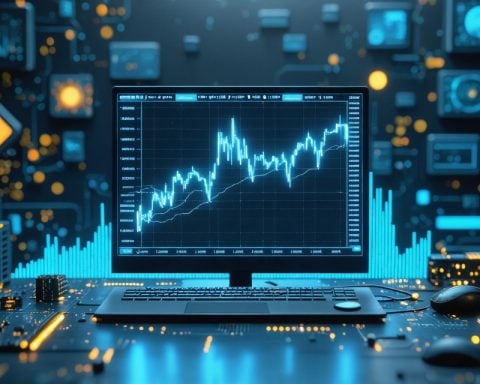The Indian share market is undergoing a transformation, thanks to the integration of cutting-edge technologies that are poised to shape the future of stock investments. As automation and artificial intelligence (AI) embed themselves in the fabric of financial processes, investors are witnessing unprecedented changes in share price evaluation and investment strategies.
Recent developments show that AI-driven analytics offer a granular understanding of market patterns, enhancing investors’ ability to make informed decisions about share prices. These tools can process vast volumes of data, identifying trends and predicting future price movements with remarkable accuracy. This technology enables investors to execute strategies that range from short-term trading to long-term value investment with increased confidence.
Moreover, the growing popularity of blockchain technology promises greater transparency and security in share trading. By utilizing decentralized ledgers, blockchain can potentially eliminate fraudulent activities and ensure real-time transaction updates, enhancing market efficiency and shareholder trust.
Additionally, the rise of fintech startups in India is democratizing access to the stock market. User-friendly applications and platforms are making it easier for retail investors to engage with the market, regardless of prior financial expertise.
The confluence of these technologies signals a promising evolution for the Indian stock market. As these innovations continue to unfold, they not only influence share prices but also revolutionize how investors understand and interact with the market, setting the stage for a dynamic future in Indian finance.
The Technological Transformation of the Indian Stock Market and Its Global Implications
The integration of cutting-edge technologies like artificial intelligence (AI), blockchain, and fintech in the Indian share market represents a significant shift, bringing profound implications not just for India but potentially for global markets as well. This transformation is more than just a change in financial strategy; it ushers in a new era of how technology can intertwine with finance, affecting the environment, humanity, and the global economy.
Impact on the Environment:
One might wonder how technologies related to stock markets could influence the environment. The use of AI and blockchain can lead to significant energy consumption, particularly blockchain, which is well-known for the energy-intensive processes involved in mining and transaction validation. This increased demand for energy resources can lead to heightened carbon emissions if the energy consumed is sourced from non-renewable resources. However, on the flip side, these technologies can drive investments towards more sustainable and environmentally conscious industries. For instance, AI-driven analytics can identify and promote companies with green practices, potentially leading to an overall positive impact on environmental policies by directing capital towards more sustainable enterprises.
Impact on Humanity:
The democratization of access to financial markets through fintech startups has the potential to significantly influence social structures. By enabling individuals from diverse socioeconomic backgrounds to participate in the stock market, fintech platforms foster financial literacy and inclusivity. This democratization offers individuals the power to build wealth and achieve financial independence, which can reduce economic inequality. In the long term, this empowerment could lead to more democratically driven economies where wealth is not concentrated in the hands of a few.
Impact on the Economy:
From an economic perspective, the transformation augurs a more efficient and transparent market environment. Technologies like blockchain enhance security and trust, crucial for market stability. AI’s predictive analytics equip investors with precise data, reducing risk and speculation. As these technologies mature, they could lead to diverse economic outcomes, including enhanced market competitiveness, new financial products and services, and perhaps new regulatory frameworks to ensure equitable growth.
Global Implications and The Future of Humanity:
The evolving Indian stock market, powered by these technologies, sets a precedent that could be emulated globally. As India spearheads this financial evolution, it could become a model for integrating technology into traditional financial markets, potentially influencing global regulatory standards and market practices. This could lead to a globally connected financial ecosystem, where real-time data sharing and cross-border trading become seamless, promoting international collaboration and economic growth.
Looking towards the future, these technological advancements could reshape not just stock markets but also how we perceive wealth, sustainability, and economic growth. They hold the potential to redefine human engagement with finance, fostering a global economy that is more inclusive, sustainable, and resilient. The journey of the Indian stock market could be the starting point of a worldwide transformation that ensures a harmonized future for humanity, where technology serves as a catalyst for equitable progress.
AI and Blockchain: The Next Frontier in Indian Share Market Transformation
The Indian share market is entering an era of transformational change, driven by groundbreaking technologies poised to redefine stock investments. Here’s an insightful look into how these advancements are reshaping the future of investing.
AI-Driven Market Analysis: A New Era of Investment Insights
Artificial Intelligence is carving out a niche in the financial sector by offering sophisticated tools that can analyze market trends with precision. AI’s ability to sift through vast datasets allows investors to predict market shifts, making informed decisions on share prices with newfound accuracy. This technological edge benefits both short-term traders and long-term investors, fostering a more strategic approach to stock market engagement.
Blockchain Technology: Enhancing Security and Transparency
As blockchain technology gains traction, its applications in the stock market are becoming increasingly evident. By employing decentralized ledgers, blockchain ensures that transactions are both secure and transparent, significantly reducing the risk of fraud. The real-time updating capability of blockchain not only improves market efficiency but also reinforces shareholder trust, marking a substantial upgrade to traditional trading systems.
The Rise of Fintech Startups: Building a More Inclusive Market
Fintech innovations are leveling the playing field by democratizing access to stock markets. These startups are creating user-friendly platforms that empower retail investors with various financial backgrounds to participate actively in trading. This inclusivity is crucial for broadening market participation and sustaining growth within the Indian economy.
Predictions and Trends: Navigating the Future of Indian Finance
Looking ahead, the continuous integration of AI and blockchain is anticipated to further transform the Indian stock market landscape. The emphasis will likely be on creating more robust and efficient markets where transparency and informed decision-making take center stage. These trends point towards a dynamic and exciting future for investors, offering numerous opportunities and challenges as technological innovations unfold.
Explore more about the latest financial technologies by visiting the Nasdaq and Bloomberg main domains to stay informed. These platforms provide comprehensive insights into global financial markets and emerging technologies shaping them.
As AI and blockchain continue to evolve, they hold the potential to not only influence share prices but also revolutionize investor engagement with the market. This evolution marks a pivotal moment in Indian finance, heralding a future characterized by enhanced understanding and interaction within the stock market.



















